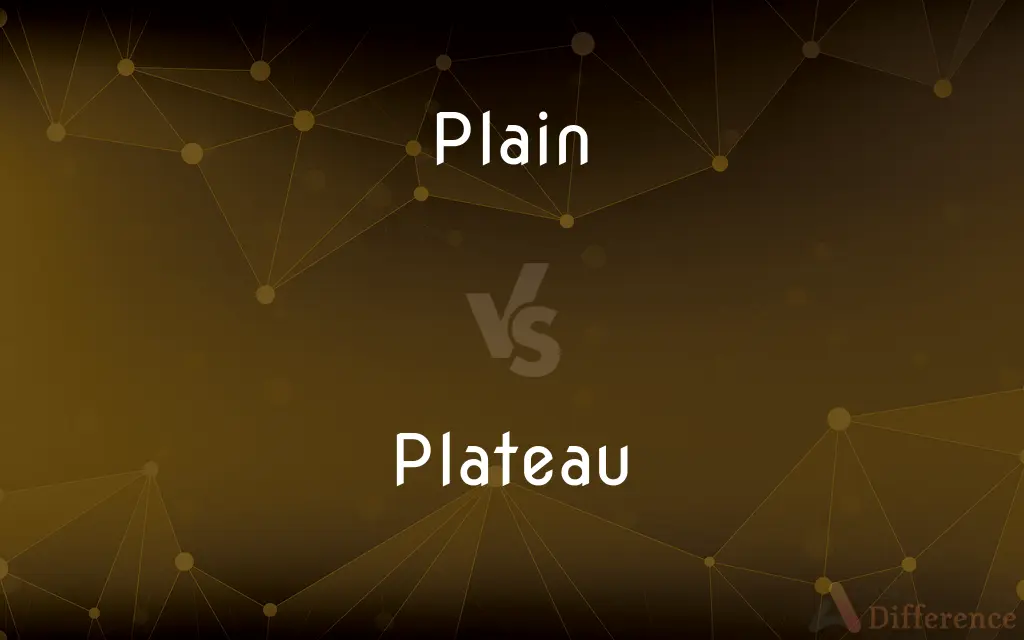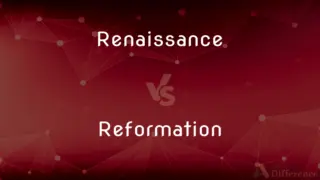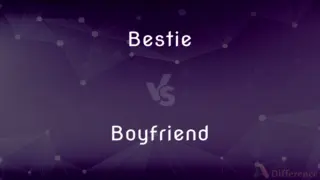Plain vs. Plateau — What's the Difference?
By Tayyaba Rehman — Updated on September 20, 2023
A plain is a flat, sweeping expanse of land, often without significant hills. A plateau, on the other hand, is an elevated flat area that has been lifted above the surrounding area, often by tectonic forces or erosion.

Difference Between Plain and Plateau
Table of Contents
ADVERTISEMENT
Key Differences
Plain refers to broad, expansive flatlands, typically characterized by lowlands with minimal elevation from its surroundings. In contrast, a Plateau is also a flat expanse but distinguishes itself by being elevated significantly higher than its adjacent surroundings.
While a Plain can be found at various altitudes, it’s the relative flatness and lack of significant elevation that define it. Conversely, a Plateau stands out because of its notable height and often presents itself as a flat-topped elevation, sometimes referred to as a tableland.
Plains are often formed by various processes, including sediment deposition by water and wind, or they can be ancient sea beds. Plateaus, in contrast, are generally formed by tectonic forces, volcanic activities, or erosion that uplifts an area while leaving the top relatively flat.
The vegetation and climate of a Plain can vary significantly based on its altitude and location. It can be arid, fertile, or marshy. On the other hand, due to the elevation of a Plateau, its climate can be cooler and might have different vegetation compared to the lowlands surrounding it.
Both Plain and Plateau serve essential roles in the ecosystem and human civilization. Plains often host significant agricultural activities due to their fertile nature, while Plateaus can be resource-rich, offering minerals and other raw materials.
ADVERTISEMENT
Comparison Chart
Definition
Flat, sweeping expanse of land without major hills.
Elevated, flat expanse lifted above surroundings.
Formation
Sediment deposition, ancient sea beds.
Tectonic uplift, volcanic activity, erosion.
Altitude
Varies; often at low altitudes.
Elevated above surrounding areas.
Climate & Vegetation
Varies widely based on location and altitude.
Often cooler due to elevation.
Economic Significance
Often used for agriculture.
Resource-rich, used for mining or tourism.
Compare with Definitions
Plain
Lowlands: A relatively level ground compared to its surroundings.
The plain stretched for miles, offering an unobstructed view.
Plateau
Flat-Topped: An elevated landform with a level surface.
The Deccan Plateau in India has rich volcanic soil.
Plain
Agricultural Land: Flat land often used for farming purposes.
The plain was dotted with farms and fields of crops.
Plateau
Tectonic Uplift: Land raised due to tectonic forces or volcanic activities.
The plateau was once a hotspot for volcanic eruptions.
Plain
In geography, a plain is a flat expanse of land that generally does not change much in elevation, and are primarily treeless. Plains occur as lowlands along valleys or at the base of mountains, as coastal plains, and as plateaus or uplands.In a valley, a plain is enclosed on two sides, but in other cases a plain may be delineated by a complete or partial ring of hills, by mountains, or by cliffs.
Plateau
Elevated Land: A flat-topped landform that’s elevated above its surroundings.
The Colorado Plateau showcases stunning geological formations.
Plain
Not decorated or elaborate; simple or basic in character
Everyone dined at a plain wooden table
Good plain food
Plateau
Distinct Ecosystem: Due to its elevation, it often hosts unique flora and fauna.
The animals on the plateau had adapted to its cooler climate.
Plain
Having no pretensions; not remarkable or special
A plain, honest man with no nonsense about him
Plateau
In geology and physical geography, a plateau ( , , or ; French: [pla.to]; plural plateaus or plateaux), also called a high plain or a tableland, is an area of a highland consisting of flat terrain, that is raised sharply above the surrounding area on at least one side. Often one or more sides have deep hills.
Plain
Easy to perceive or understand; clear
The advantages were plain to see
It was plain that something was wrong
Plateau
An area of fairly level high ground.
Plain
(of a person) not beautiful or attractive
A plain, round-faced woman
Plateau
A state of little or no change following a period of activity or progress
The peace process had reached a plateau
Plain
Sheer; simple (used for emphasis)
The main problem is just plain exhaustion
Plateau
Reach a state of little or no change after a period of activity or progress
The industry's problems have plateaued out
Plain
Denoting or relating to a type of knitting stitch produced by putting the needle through the front of each stitch from left to right.
Plateau
An elevated, comparatively level expanse of land; a tableland.
Plain
Used for emphasis
Perhaps the youth was just plain stupid
Plateau
A relatively stable level, period, or state
Mortgage rates declined, then reached a plateau.
Plain
Clearly or unequivocally
I'm finished with you, I'll tell you plain
Plateau
To reach a stable level; level off
"The tension seemed to grow by degrees, then it plateaued" (Tom Clancy).
Plain
A large area of flat land with few trees
The coastal plain
Plateau
A largely level expanse of land at a high elevation; tableland.
Plain
Mourn or lament.
Plateau
(of a varying quantity) A comparatively stable level after a period of increase.
Plain
Free from obstructions; open; clear
In plain view.
Plateau
(dated) An ornamental dish for the table; a tray or salver.
Plain
Obvious to the perception or mind; evident
Make one's intention plain.
Plateau
A notable level of attainment or achievement.
Plain
Not elaborate or complicated; simple
Plain food.
Plateau
(intransitive) (of a varying quantity) To reach a stable level after a period of increase; to level off.
Plain
Marked by little or no ornamentation or decoration
Plain garb.
Plateau
A flat surface; especially, a broad, level, elevated area of land; a table-land.
Plain
Straightforward; frank or candid
Plain talk.
Plateau
An ornamental dish for the table; a tray or salver.
Plain
Not pretentious; unaffected.
Plateau
A relatively flat highland
Plain
Lacking beauty or distinction
A plain face.
Plateau
High Ground: A raised area often resulting from tectonic activities.
The plateau offered a vantage point to see the valley below.
Plain
Not mixed with other substances; pure
Plain water.
Plain
Common in rank or station; average; ordinary
A plain man.
Plain
Not dyed, twilled, or patterned
A plain fabric.
Plain
Sheer; utter; unqualified
Plain stupidity.
Plain
(Archaic) Having no visible elevation or depression; flat; level.
Plain
Often plains An extensive, level, usually treeless area of land.
Plain
A broad level expanse, as a part of the sea floor or a lunar mare.
Plain
Something free of ornamentation or extraneous matter.
Plain
Clearly; simply
Plain stubborn.
Plain
Flat, level.
Plain
Simple, unaltered.
Plain
Ordinary; lacking adornment or ornamentation; unembellished.
He was dressed simply in plain black clothes.
A plain tune
Plain
Of just one colour; lacking a pattern.
A plain pink polycotton skirt
Plain
Simple in habits or qualities; unsophisticated, not exceptional, ordinary.
They're just plain people like you or me.
Plain
(of food) Having only few ingredients, or no additional ingredients or seasonings; not elaborate, without toppings or extras.
Would you like a poppy bagel or a plain bagel?
Plain
(computing) Containing no extended or nonprinting characters (especially in plain text).
Plain
Obvious.
Plain
Evident to one's senses or reason; manifest, clear, unmistakable.
Plain
Downright; total, unmistakable (as intensifier).
His answer was just plain nonsense.
Plain
Open.
Plain
Honest and without deception; candid, open; blunt.
Let me be plain with you: I don't like her.
Plain
Clear; unencumbered; equal; fair.
Plain
Not unusually beautiful; unattractive.
Throughout high school she worried that she had a rather plain face.
Plain
(card games) Not a trump.
Plain
(obsolete) Full, complete in number or extent.
Plain
(colloquial) Simply.
It was just plain stupid.
I plain forgot.
Plain
(archaic) Plainly; distinctly.
Tell me plain: do you love me or no?
Plain
A lamentation.
Plain
An expanse of land with relatively low relief, usually exclusive of forests, deserts, and wastelands.
Plain
(archaic) field in reference to a battlefield.
Plain
(obsolete) plane: a flat geometric field.
Plain
To complain.
Plain
To lament, bewail.
To plain a loss
Plain
To level; to raze; to make plain or even on the surface.
Plain
To make plain or manifest; to explain.
Plain
To lament; to bewail; to complain.
We with piteous heart unto you pleyne.
Plain
To lament; to mourn over; as, to plain a loss.
Plain
To plane or level; to make plain or even on the surface.
We would rake Europe rather, plain the East.
Plain
To make plain or manifest; to explain.
What's dumb in show, I'll plain in speech.
Plain
Without elevations or depressions; flat; level; smooth; even. See Plane.
The crooked shall be made straight, and the rough places plain.
Plain
Open; clear; unencumbered; equal; fair.
Our troops beat an army in plain fight.
Plain
Not intricate or difficult; evident; manifest; obvious; clear; unmistakable.
Plain
Void of extraneous beauty or ornament; without conspicious embellishment; not rich; simple.
Plain
In a plain manner; plainly.
Plain
Level land; usually, an open field or a broad stretch of land with an even surface, or a surface little varied by inequalities; as, the plain of Jordan; the American plains, or prairies.
Descending fro the mountain into playn.
Him the AmmoniteWorshiped in Rabba and her watery plain.
Plain
A field of battle.
Lead forth my soldiers to the plain.
Plain
Extensive tract of level open land;
They emerged from the woods onto a vast open plain
He longed for the fields of his youth
Plain
A basic knitting stitch
Plain
Express complaints, discontent, displeasure, or unhappiness;
My mother complains all day
She has a lot to kick about
Plain
Clearly apparent or obvious to the mind or senses;
The effects of the drought are apparent to anyone who sees the parched fields
Evident hostility
Manifest disapproval
Patent advantages
Made his meaning plain
It is plain that he is no reactionary
In plain view
Plain
Not elaborate or elaborated; simple;
Plain food
Stuck to the plain facts
A plain blue suit
A plain rectangular brick building
Plain
Lacking patterns especially in color
Plain
Not mixed with extraneous elements;
Plain water
Sheer wine
Not an unmixed blessing
Plain
Free from any effort to soften to disguise;
The plain and unvarnished truth
The unvarnished candor of old people and children
Plain
Lacking embellishment or ornamentation;
A plain hair style
Unembellished white walls
Functional architecture featuring stark unornamented concrete
Plain
Lacking stylistic embellishment;
A literal description
Wrote good but plain prose
A plain unadorned account of the coronation
A forthright unembellished style
Plain
Comprehensible to the general public;
Written for the popular press in plain nontechnical language
Plain
Lacking in physical beauty or proportion;
A homely child
Several of the buildings were downright homely
A plain girl with a freckled face
Plain
Unmistakably (`plain' is often used informally for `plainly');
The answer is obviously wrong
She was in bed and evidently in great pain
He was manifestly too important to leave off the guest list
It is all patently nonsense
She has apparently been living here for some time
I thought he owned the property, but apparently not
You are plainly wrong
He is plain stubborn
Plain
Flat Land: A broad area of flat land without significant elevations.
The Midwest is known for its vast plains.
Plain
No Hills: An expanse of land without notable hills or mountains.
The plain was easy to traverse by foot.
Plain
Geographical Feature: A significant landform characterized by flatness.
The Serengeti Plain is famous for its wildlife migrations.
Common Curiosities
Are all plateaus elevated plains?
While plateaus are elevated flat areas, not all of them can be classified as elevated plains due to formation differences.
Which is typically more fertile: a plain or plateau?
Plains, especially river plains, are often more fertile, but it can vary based on geological history.
Why are plateaus cooler than surrounding areas?
The elevation of plateaus often results in cooler temperatures compared to lowland areas.
Is the Great Plains in the U.S. a plateau?
No, the Great Plains is a vast expanse of flat land and is considered a plain, not a plateau.
Are there deserts on plains?
Yes, some plains, based on their location and climate, can be desert plains.
Can plains have rivers?
Yes, many plains have rivers that flow through them, often shaping the plain itself.
Are all plains flat?
While plains are generally flat, they can have slight undulations and variations.
Do plateaus have cliffs or steep edges?
Many plateaus have cliffs or escarpments on their sides due to erosional processes.
Are plains and plateaus prone to erosion?
Both can be affected by erosion, but plateaus, with their steep sides, might be more visibly impacted.
Are plateaus always found in mountainous regions?
No, plateaus can exist in various settings, not just near mountains.
Can plateaus support agriculture?
Yes, some plateaus, especially those with volcanic soil, can be agriculturally productive.
How do humans use plateaus?
Plateaus can be used for agriculture, mining, or settlements, depending on their resources.
What causes the formation of a plateau?
Plateaus can form due to tectonic forces, volcanic activity, or erosion.
Can plateaus be found in deserts?
Yes, many deserts have plateaus with unique landforms and ecosystems.
How do plains benefit ecosystems?
Plains often serve as habitats for diverse species and can play a role in migration routes and nutrient cycling.
Share Your Discovery

Previous Comparison
Renaissance vs. Reformation
Next Comparison
Bestie vs. BoyfriendAuthor Spotlight
Written by
Tayyaba RehmanTayyaba Rehman is a distinguished writer, currently serving as a primary contributor to askdifference.com. As a researcher in semantics and etymology, Tayyaba's passion for the complexity of languages and their distinctions has found a perfect home on the platform. Tayyaba delves into the intricacies of language, distinguishing between commonly confused words and phrases, thereby providing clarity for readers worldwide.















































